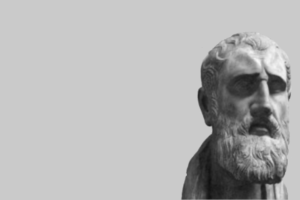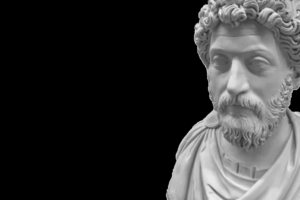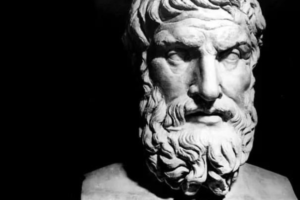Seneca (4 BC–65 AD), formally known as Seneca Lucius Annaeus or Seneca the Younger, is best remembered as an influential Stoic philosopher, powerful statesman, and a noted playwright in Ancient Rome. Born in Hispania (modern day Spain), but moved to Rome around 5 AD. He undertook the education afforded to Rome’s elite class, consisting of rhetoric, literature, grammar, and philosophy. His father, Seneca the Elder, a famed author of several surviving books concerning rhetoric, likely inspired the younger. While still young, he received philosophical training from three of the leading Stoic philosophers of the period. He would develop into one of the most influential voices of Stoicism along with Epictetus and Marcus Aurelius.
Seneca often had breathing difficulties throughout his life, probably due to asthma. At some point in his mid-twenties (circa 20 AD), he may have contracted tuberculosis. He went to Egypt to live with his aunt, whose husband was the governor of Egypt. She nursed him through a period of ill health that lasted up to ten years. In 31 AD, he returned to Rome with his aunt, his uncle having died en route in a shipwreck. Elected into office in about 37 AD, his aunt’s political influence helping to achieve this position. This also earned him the right to sit in the Roman Senate.
Seneca appears to have had a successful early career as a senator, and he was lauded for his oratory skills. In 41 AD, Claudius became Emperor and Seneca’s standing became unstable. Accusations of adultery hindered his political advancement, viewed by some historians as being similar to the political backstabbing common in our current time. Seneca was ultimately forced into an eight-year exile on the island of Corsica as a result of this. Two of his earliest surviving works date from this period. Consolations to Helvia, in which he consoles his mother following his exile. Seneca’s other work of this period, his Consolation to Polybius, focused on consoling Polybius on the death of his brother. When the political climate changed in 49 AD, Claudius invited Seneca to return to Rome from his eight-year exile. After returning to the Roman capital, Seneca served as Nero’s tutor.
Seneca became as an advisor to Emperor Nero in 54 AD. With time, Seneca’s power over Nero waned. In 62 and 64 AD, Seneca made two attempts to retire, but Nero rejected both of his requests. Seneca, though, started to show up less and less at court. He settled into a peaceful way of life on his country estates. There he focused on his studies and sparingly traveling to Rome. His Letters to Lucilius, which describe his philosophical ideas and are regarded as one of the pillars of Stoicism, and Naturales quaestiones, an encyclopedia of the natural studies, were both written during these last few years of his life.
There was an assassination plot against Nero in 65 AD. Seneca somehow became accused of being part of the plot, though he was likely innocent. Following the custom of that time, and the orders of the Emperor, Seneca took his own life. His stoic and calm suicide has become the subject of numerous accounts and several famous paintings.
His Teachings
Seneca is best known for his philosophical works and major contribution to Stoic thought. Though he was a renowned statesman and outstanding writer, he is best remembered for being one of the three greatest Stoic thinkers. His body of work on stoicism consists of 124 letters and 12 essays that address different moral dilemmas. Seneca’s writings represent one of the most significant collections of ancient Stoic thought. What counsel did he offer, and what meaningful advice can we glean from his writings that would be applicable today?
According to Seneca, nothing is more damaging than a violent emotion out of control. He was all too aware of how destructive rage of Roman Emperors could be. Particularly when they were in control of someone with the ability to determine another person’s fate. He contended that destructive emotions like rage, envy, or fear of others are unnatural. That they impair our inherent sociability. How can we best stop this unnatural loop, then? Seneca’s reaction is that all we need to do is acknowledge that neither they nor we are faultless. That we should extend a little more tolerance to one another.
Seneca maintained that most people only have fleeting experiences of living in the truest, most involved sense of the word. The rest of the time, they are preoccupied with unimportant things and don’t actually pay attention to anything at all, let alone anything important. If one is occupied with several tasks at once, it becomes impossible to complete any one of them well. We are constantly occupied, but before we realize it, we have accomplished nothing. Many people state that life is too short. Seneca advocated that we shouldn’t waste our time and that is the reason for this common concept. Despite the reality that time is incomparably more valuable than money, people frequently offer their time to others in ways they would never do with money. Time, on the other hand, is irreplaceable.
The distracted individual is frequently preoccupied, pursuing and obtaining things without ever having the time to enjoy them. For many people, leisure typically refers to a wide range of extracurricular activities that can be just as demanding as paid job. Seneca didn’t have it in mind. In the beginning, he meant doing nothing, being fully aware in the present moment and unaffected by distractions or preoccupations. Seneca mentions games, athletics, and even sunbathing as examples of leisure activities that don’t qualify. Therefore, the first step entails just slowing down, sitting still, and becoming totally present in the moment. He believed that this was essentially a solitary endeavor because, often, we perform best when left alone and uninfluenced by others.
Seneca argued that investing time in intellectual activities is the only truly worthwhile use of leisure time. Naturally, he brings up philosophy, but he defines it broadly, including both philosophical concerns and what we would today characterize as science and history. Seneca also wrote dramas in his spare time. All of these activities involve thoughtful consideration of the world and our place in it, which is what ties them together. Such introspection is not only valuable in and of itself, but it also places our own lives in context and enables us to identify the things that are important to us.
Seneca believed that a great deal of people squander their lives trying to acquire money that they will never have the chance to appreciate. They will struggle to obtain it, and once they do, they will worry about losing it. The more they have, the more bitter they become. They are continuously focused on how some people have more wealth or possessions than them. They are unlikely to have any time left over for the kind of leisure Seneca believed actually mattered if they are successful and lead an opulent lifestyle.
As he expressed it, such accomplishment is gained at the expense of life. He claimed that there is a simple solution to all of this: just settle for a modest and thrifty way of living. There is no reason to pursue any additional goals after the necessities have been taken care of. Some people experience true deprivation. The majority are locked in a never-ending pursuit of more and more, unaware that they already have everything they require.
Many of the things that people typically view as disadvantages should instead be viewed as advantages. He contended that a superb, virtuous character is the only thing that is truly desirable. Objects and events are merely incidental and have no real value. All things being equal, we’d all prefer to be healthy than ill, but as long as one is of good character, it is still possible to lead a fulfilling life even while ill. Resilience, courage, and perseverance are admirable qualities that are hard-won via experience with adversity rather than emerging naturally.
He was aware of the dangers of ambition because he had reached the pinnacle and fallen from it more than once. When we fail, which we undoubtedly will at least occasionally, ambition fuels our desires and expectations, resulting in frustration and disappointment. Although it’s ideal to steer clear of those kinds of emotional reactions to failures, since nobody is flawless, we will all occasionally experience them. We might also want to pause and consider what it is that we are working so hard to achieve in light of what we have already. Seneca does not consider material prosperity to be important beyond what is necessary for a simple, comfortable life. The time spent engaging in meaningful leisure activities is more valuable than anything else, because ambition all too frequently takes up our time instead of releasing it.
So what should we be doing with our life, according to Seneca? He has already praised the importance of academic disciplines like philosophy. Although he wasn’t overly directive about it, he did say that everyone needs an essential, fulfilling activity in their lives, regardless of what it is. Too many individuals drift about aimlessly, wasting time, and before they realize it, their lives are over. He advises finding something, whatever it may be, that feels like a good use of your limited time, so that when the time comes to pass, you will have something to show for your short time on earth.
Influence
Seneca had a significant impact on subsequent generations. In the Middle Ages and Renaissance, his ideas gained popularity. He has gained equal stature with Aristotle and Plato. His ideas helped lay the groundwork for early humanist thought, along with Cicero’s. Needless to say, many of the brightest minds in Europe respected and diligently studied Seneca’s teachings. Seneca had an impact on renowned individuals down to the present, including Erasmus, Francis Bacon, Pascal, and Montaigne. Seneca not only wrote about philosophy but also applied it to dealing with life’s positives and negatives. From massive wealth to exile, he handled with dignity the suicide order from his former pupil, Nero.









Most Commented Posts